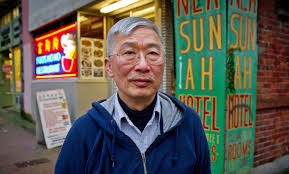Jim Wong-Chu

Works by Jim Wong-Chu:
From ABC BookWorld, "LITERARY LOCATION: 311 East 41st Avenue, Vancouver. Here Jim Wong-Chu did most of his writing for Chinatown Ghosts, the first commercially published volume of poetry by a Chinese Canadian. Also at this address he met with other Asian Canadian writers and incorporated the Asian Canadian Writers' Workshop, giving rise to the literary periodical Ricepaper. He later sold the house and moved to Champlain Heights.
Chinese Canadians weren't granted the federal vote in Canada until 1947 and they first voted provincially in 1949.
Jim Wong-Chu was brought to Canada at age four in 1953 where he was raised by aunts and uncles as a 'paper son' with false documents. At age seven he learned the woman he thought was his mother was an aunt who has lost a child born about the same time as him. He would no be able to unite with his biological family in his adopted land until many years later. He spent much of his childhood in the town of Merritt where he worked in Chinese cafes doing chores after school and on weekends. He pealed so many potatoes--150 pounds per day--that he was eventually able to do the job without looking.
As a young man he came to Vancouver and worked for BC Ferries. This led to a job as a letter carrier for Canada Post. Before he became "the Moses of Asian Canadian literature," he relearned Cantonese in Vancouver and worked as a community volunteer. The stories he gathered from the Chinese Canadian community educated him about the racial injustices faced by previous generations and also emboldened him to fashion his own identity as someone who became a Canadian under fraudulent circumstance that were not of his own making.
Accurately described by Tom Hawthorn in a Globe & Mail obituary as "a serious and determined figure," he eventually was able to buy a modest house at 311 East 41st Avenue that became a germinating for advancing literary and cultural concerns. Jim Wong-Chu became very involved in the Pender Guy radio program on Vancouver Co-op Radio, now cited as the first English-language program devoted to Chinese Canadians. From 1973 onwards, he was also involved in a private photographic mission to document life in Vancouver's Chinatown. His ambitions were more social than literary, but after one his own poems called old chinese cemetery (kamloops, 1977/july appeared in an anthology of Japanese and Chinese writers called Inalienable Rice in 1979, he began to favour writing over photography.
His 63-page poetry book pertaining to Vancouver's Chinatown, Chinatown Ghosts, which appeared in 1986 from Pulp Press, as now viewed as the first such collection by a Chinese Canadian. With encouragement from publlsher Scott McIntyre, this led to a collaboration with Vancouver lawyer Bennett Lee, a third-generation Chinese Canadian from Victoria, for their co-edited anthology of contemporary writing by Chinese Canadians, Many-Mouthed Birds: Contemporary Writing by Chinese Canadians (D&M 1991). While searching for content, Wong-Chu came across Wayson Choy's short story, The Jade Peony. Although this story by the first Chinese Canadian graduate of UBC's Creative Writing department had appeared in various publications, the story goes that its appearance in the anthology kick-started the process whereby Choy was encouraged to expand the story into the acclaimed novel of the same name.
Wong-Chu became a founding member of Asian Canadian Writers Workshop and he was interviewed by Jurgen Hesse for inclusion in Hesse's In Voices of Change: Immigrant Writers Speak Out (Pulp Press, 1990 / pages 184-201).
Jim Wong-Chu suffered a stroke in March of 2017 and died on July, 11, 2017. He was survived by his wife Marlene Enns, a stepdaughter, three brothers, three sisters and his mother. He was a hard man to make happy. But his stern countenance did not prevent him from being greatly respected and loved by those who knew him well."